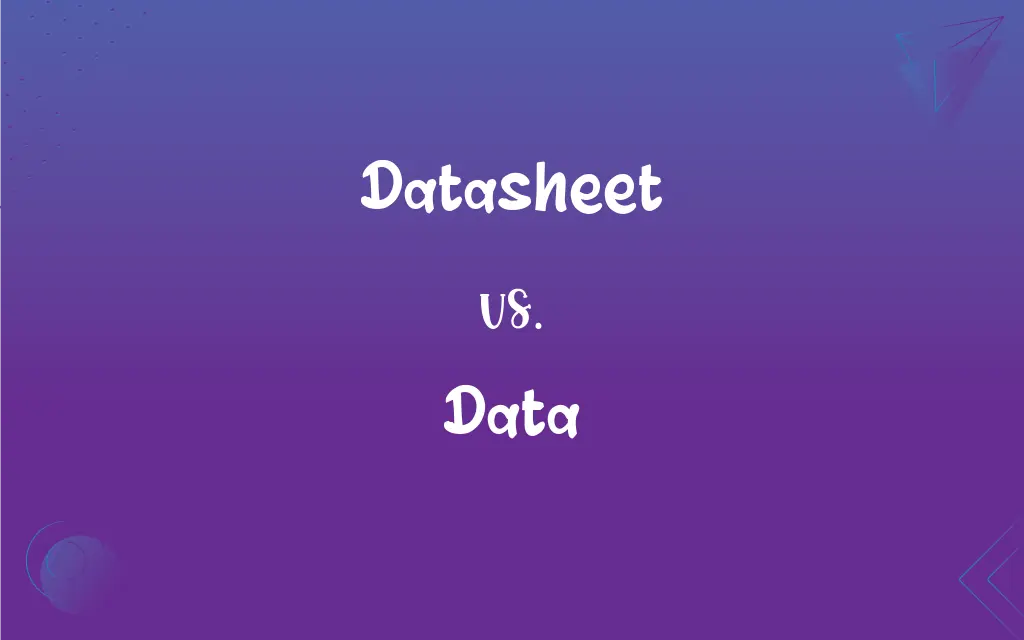Datasheet vs. Data: What's the Difference?
Edited by Harlon Moss || By Janet White || Updated on September 26, 2023
Datasheet refers to a document providing specific information about a product; data are individual facts, statistics, or information collected for analysis.

Key Differences
Datasheet and data are terms that serve distinct purposes within information and technology domains. A datasheet is a document, typically provided by manufacturers, containing details, specifications, and other information about a product, component, or software. It is an organized collection of details that may include data, but its purpose is to communicate specific information about the item it represents. It is a tool utilized by engineers, designers, and consumers to understand the characteristics and functionalities of a product or component.
Data, on the other hand, represent individual facts, statistics, or items of information that are collected, analyzed, and used to make decisions or predictions. Data is a crucial element in various fields like science, technology, business, and research. It is the raw, unorganized information that can be processed and analyzed to extract meaningful insights. Data is versatile and ubiquitous, forming the backbone of information technology and scientific research, where it is used to develop new technologies, make advancements, and optimize processes.
Datasheets are comprehensive and contain a plethora of data, including the technical specifications, usage instructions, and safety information about a product. They are structured and organized to ensure clarity and ease of use, allowing users to quickly find the information they are seeking. They are crucial in helping users understand the capabilities and limitations of a product, providing a detailed overview that can aid in making informed decisions.
Data is variable and can exist in different forms, such as numbers, text, images, and more. It is collected from various sources and can be qualitative or quantitative. It is the foundation upon which analysis and interpretations are built, leading to the formulation of conclusions and the making of informed decisions. Data, being raw and unprocessed, needs to be analyzed and interpreted to extract value and insights.
While the datasheet is a detailed document presenting specific information about a product or component in a structured format, data is the collection of raw facts and figures that can be processed and analyzed for various purposes. The datasheet is specialized and informative, focusing on providing detailed insights about a specific item, whereas data is versatile, universal, and forms the basis of analysis in various domains.
ADVERTISEMENT
Comparison Chart
Definition
A document providing detailed specifications about a product.
Raw facts and statistics collected for reference or analysis.
Form
Structured document.
Can be numbers, text, images, etc.
Purpose
To give specific information about a product or component.
To be analyzed and interpreted to extract insights.
Usage
Used by manufacturers, engineers, designers, and consumers.
Used in various fields like science, technology, and business.
Scope
Specific to a product or component.
Universal and versatile.
ADVERTISEMENT
Datasheet and Data Definitions
Datasheet
A technical document providing information about the features and applications of a product.
The datasheet revealed the operating temperature of the microcontroller.
Data
A collection of facts and figures that represent values or measurements.
The data was processed to extract meaningful patterns.
Datasheet
An organized collection of information about the properties, functionality, and usage of a product or component.
The manufacturer included a datasheet with the product for user reference.
Data
Information in numerical form that can be digitally transmitted or processed.
The server stores vast amounts of data.
Datasheet
A document detailing the specifications and characteristics of a product.
The engineer consulted the datasheet to understand the component's limitations.
Data
Unprocessed information that can be qualitative or quantitative.
The data points suggested a trend in consumer behavior.
Datasheet
A sheet or document that contains specific data regarding a product's features and specifications.
To select the appropriate resistor, refer to its datasheet.
Data
Raw information or details collected for analysis or reference.
Researchers analyze data to draw conclusions.
Datasheet
A comprehensive document that provides detailed information about a product, including its usage, maintenance, and safety instructions.
The datasheet contains valuable information on the software’s capabilities and requirements.
Data
Individual facts, statistics, or items of information.
The data collected from the survey was insightful.
Datasheet
A document summarizing the performance and other technical characteristics of a product.
Data
Plural of datum
Datasheet
A display of the records in a table, arranged in rows and columns.
Data
Information, especially in a scientific or computational context, or with the implication that it is organized.
The raw information was processed and placed into a database so the data could be accessed more quickly.
Data
(collectively) Recorded observations that are usually presented in a structured format.
Data
(computing) A representation of facts or ideas in a formalized manner capable of being communicated or manipulated by some process.
Data
Senseid|en|telephony}}(mobile telephony) {{ellipsis of mobile data: digital information transmitted using the cellular telephone network rather than Wi-Fi.
Run out of data
Data
See Datum.
Data
A collection of facts, observations, or other information related to a particular question or problem; as, the historical data show that the budget deficit is only a small factor in determining interest rates.
Data
Information, most commonly in the form of a series of binary digits, stored on a physical storage medium for manipulation by a computer program. It is contrasted with the program which is a series of instructions used by the central processing unit of a computer to manipulate the data. In some conputers data and execuatble programs are stored in separate locations.
Data
A collection of facts from which conclusions may be drawn;
Statistical data
FAQs
Does every product come with a Datasheet?
Not necessarily, but manufacturers often provide datasheets for detailed product information.
Can Data be in any form?
Yes, data can be text, numbers, images, etc., representing information.
Is a Datasheet always related to electronic components?
No, datasheets can be related to any product providing specific information about it.
Is a Datasheet the same as Data?
No, a datasheet is a structured document providing product information; data are raw facts or figures.
Is Data always numerical?
No, data can be qualitative or quantitative, numeric or non-numeric.
Does the interpretation of Data require expertise?
Often, interpreting data can require specialized knowledge or expertise.
Can Data be collected from various sources?
Yes, data can be collected from multiple sources, like surveys, experiments, etc.
Are Datasheets only used by engineers?
No, datasheets are used by manufacturers, designers, consumers, and engineers.
Can Data be found in a Datasheet?
Yes, datasheets often contain data specific to the product’s features and specifications.
Are Datasheets available online?
Often, datasheets can be accessed online, especially for electronic components.
Do Datasheets contain safety information?
Yes, datasheets often include safety, usage, and maintenance information about a product.
Is the information in a Datasheet always accurate?
Datasheets provided by reputable manufacturers are typically accurate and reliable.
Can the information in a Datasheet be considered as Data?
Yes, the specific information and specifications in a datasheet are forms of data.
Can Data be processed and analyzed to make predictions?
Yes, data analysis can lead to predictions, insights, and informed decisions.
Is all Data useful for analysis?
Not necessarily, the utility of data depends on its relevance and quality.
About Author
Written by
Janet WhiteJanet White has been an esteemed writer and blogger for Difference Wiki. Holding a Master's degree in Science and Medical Journalism from the prestigious Boston University, she has consistently demonstrated her expertise and passion for her field. When she's not immersed in her work, Janet relishes her time exercising, delving into a good book, and cherishing moments with friends and family.
Edited by
Harlon MossHarlon is a seasoned quality moderator and accomplished content writer for Difference Wiki. An alumnus of the prestigious University of California, he earned his degree in Computer Science. Leveraging his academic background, Harlon brings a meticulous and informed perspective to his work, ensuring content accuracy and excellence.































































